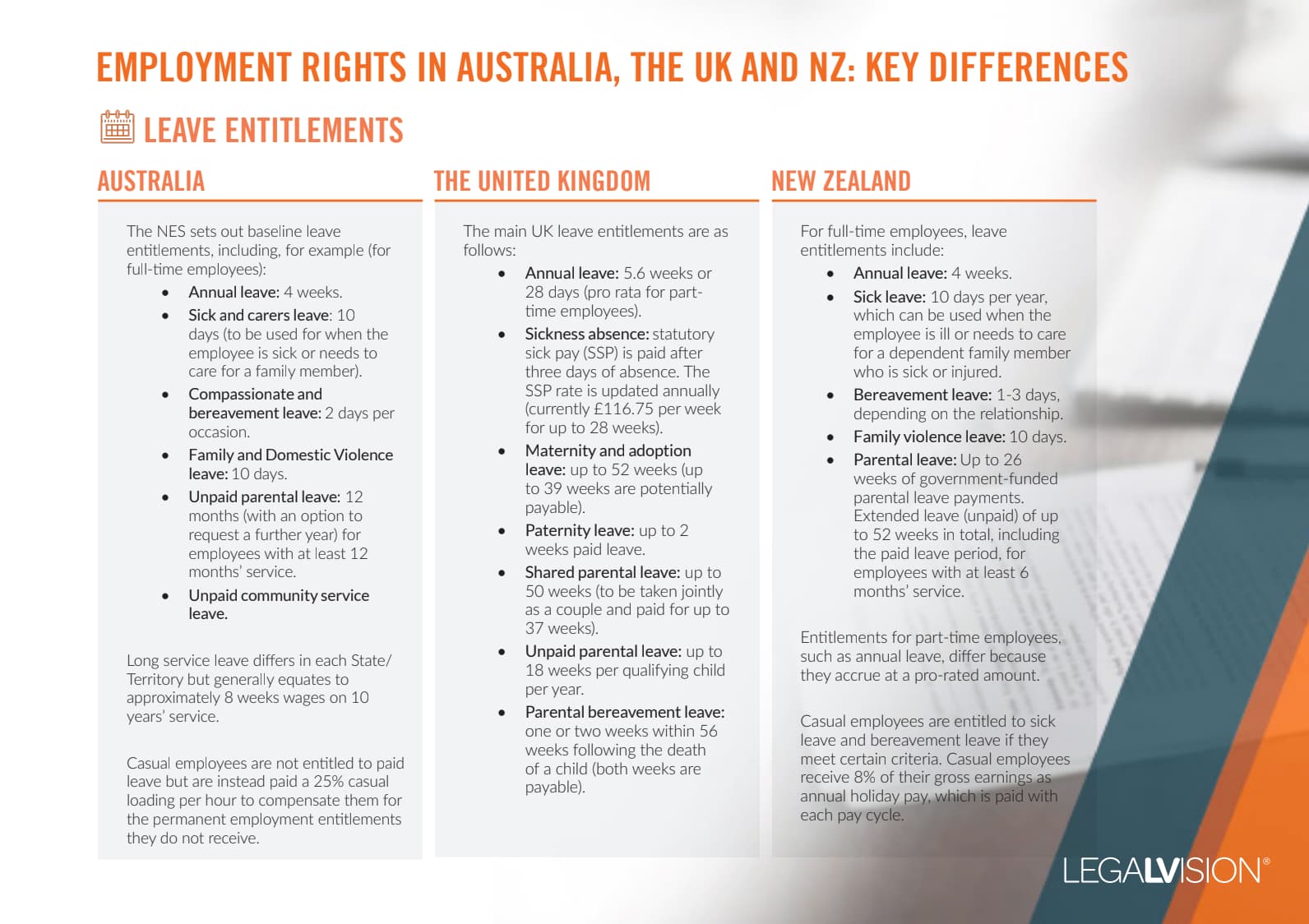In Short
- There is no general statutory right to bereavement leave in the UK, but specific rights apply in certain situations.
- Eligible employees are entitled to statutory parental bereavement leave and, in some cases, pay following the death of a child.
- Other bereavement situations rely on employer discretion, company policies or alternative statutory rights.
Tips for Businesses
Put a clear bereavement or compassionate leave policy in place so employees understand their options during difficult times. Apply policies consistently, but remain flexible where possible. Train managers to handle bereavement sensitively and avoid discrimination. Where statutory leave does not apply, consider alternatives such as compassionate leave, annual leave or time off for dependants.
As an employer, you must prepare for challenging situations your employees may face, which will affect their ability to work. One such situation is when your employee faces the death of a loved one. Not all your employees will deal with this situation in the same way. Therefore, you must be sensitive to their needs and treat your employees as individuals when they face a death, while ensuring you do not discriminate.
There is currently no general statutory right to ‘bereavement leave’ in the UK. However, specific legislative provisions do exist that grant employees certain rights in particular circumstances related to bereavement. This article will explain these statutory entitlements and explore the options available to employers for supporting employees whose situations fall outside these specific legal provisions.
Statutory Parental Bereavement Leave and Pay
Statutory parental bereavement leave (PBL) is a legal entitlement in the UK that provides employees with time off work following the death of a child. It is available to employees who lose a child under the age of 18 or who suffer a stillbirth after 24 weeks of pregnancy. The right extends to:
- parents;
- adoptive parents;
- prospective adopters;
- intended parents in surrogacy arrangements; and
- “parents in fact”, which are those who have been caring for the child in their own home for the last four weeks.
Eligible employees can take two weeks of leave. This can be taken as:
- a single block of two weeks;
- as two separate weeks of leave; or
- they can choose to take only one week of leave, any time within 56 weeks (about one year) following the child’s death.
Where your employee takes statutory parental bereavement leave, they have the right to take it as paid leave, provided the following:
- entitled to parental bereavement leave;
- employed when their child died;
- worked for their employer for at least 26 weeks, on the Saturday before the child’s death; and
- earn on average at least £125 per week, before tax.
Additionally, where your employee takes statutory parental bereavement leave in response to a stillborn at or after 24 weeks of pregnancy, they can take it after their statutory right to maternity or paternity leave. The entitlement to the latter is:
- 52 weeks of maternity leave for the birth parent; and
- two weeks of paternity leave for the partner or father of the birth parent.
Both have the right to take parental bereavement leave in addition to their statutory maternity or paternity leave. However, they must take it within 56 weeks of the date of the child’s death or stillbirth.
Alternative Options
Unfortunately, while the law provides statutory parental bereavement leave for certain situations, it does not establish general statutory bereavement rights for employees facing loss in other circumstances. For those who do not qualify for parental bereavement leave, there are no explicit legal provisions granting time off specifically for bereavement.
In these cases, employees and employers must rely on alternative arrangements or existing statutory rights that may be applicable. These could include:
- using annual leave;
- seeking compassionate leave (if offered by the employer, this can be paid or unpaid);
- potentially utilising time off for dependants in emergency situations, provided they were unaware of the situation beforehand, but noting that this is a short-term option; or
- requesting unpaid leave.
What is Compassionate Leave?
Compassionate leave, also known as bereavement leave, is a type of leave that employers may offer to employees who are dealing with a personal loss or family emergency. Unlike statutory parental bereavement leave, compassionate leave is not currently a legal requirement in the UK. Instead, it is typically offered at the discretion of the employer as part of their company policies.
The purpose of compassionate leave is to provide employees with time off to deal with the immediate impact of a bereavement or other significant personal event. This could include the death of a close family member, partner, or friend, but may also extend to other challenging life events such as the serious illness of a loved one or personal crises.
Key aspects of compassionate leave include:
- Duration: The length of compassionate leave can vary widely between employers. Some may offer a few days, while others might provide a week or more, depending on the circumstances.
- Pay: Some employers offer paid compassionate leave, while others may provide unpaid leave. The terms are usually outlined in the company’s policies or employee handbook.
- Flexibility: Many employers approach compassionate leave with flexibility, recognising that different situations may require different amounts of time off.
- Application: Typically, employees need to inform their employer as soon as possible about their need for compassionate leave and may need to provide some details about the circumstances.
- Additional Support: Some employers may offer additional support alongside compassionate leave, such as counselling services or employee assistance programs.
Call 0808 196 8584 for urgent assistance.
Otherwise, complete this form, and we will contact you within one business day.
Time Off for Family and Dependants
Time off for family and dependants is a statutory right in the UK. This right allows employees to take a reasonable amount of unpaid time off work to deal with unexpected or sudden emergencies involving their dependents. Unlike compassionate leave, which is discretionary, this is a legal entitlement for all employees, regardless of their length of service.
This right offers a safety net for workers in their time of need. Dependants are defined broadly, including:
- spouses;
- partners;
- children;
- parents; or
- anyone who relies on the employee for care.
While the statutory right is for unpaid leave, some employers may offer paid leave in these circumstances as part of their compassionate leave policies. Employees should familiarise themselves with their company’s specific approach to bereavement situations.
For those requiring more extensive time off to grieve, other forms of leave are available, such as:
- annual leave;
- unpaid leave; or
- company-specific bereavement policies.
What is a Bereavement Policy?
It is good practice for your business to have a bereavement policy. This will make it clear to your employees what you allow for when they face grief. It could contain:
- when your employee may or may not take this leave;
- the amount of leave they may take and whether this is more than the statutory entitlement;
- whether you might extend the leave where needed;
- the pay offered, if at all, when taking this leave;
- where an employee is not entitled to bereavement leave, the other options for the type of leave they may take instead; and
- how you intend to support your employees through the grief process.

Understand employment law differences in Australia, New Zealand, and the UK. Download our free factsheet today.
Key Takeaways
When your employees face the death of a loved one, you must handle this carefully and sensitively. Where the person who has died is a child, you must legally offer them two weeks of time off as parental bereavement leave to manage their grief, provided they meet the criteria outlined above. You must be clear about the rules of parental bereavement leave. For other types of bereavement, employees have varying options, including unpaid leave.
LegalVision provides ongoing legal support for UK businesses through our fixed-fee legal membership. Our experienced lawyers help businesses manage contracts, employment law, disputes, intellectual property and more, with unlimited access to specialist lawyers for a fixed monthly fee. To learn more about LegalVision’s legal membership, call 0808 196 8584 or visit our membership page.
Frequently Asked Questions
Bereavement leave is sometimes known as compassionate leave. It is time that you agree with your employee or worker to take time off to help them deal with grief.
There is only a legal requirement for an employer to grant bereavement leave to an employee who has lost a child under the age of 18, or suffers a stillbirth after 24 weeks of pregnancy. It is your discretion whether or not you allow for leave where the death is of a friend or other dependents.
There is no general legal requirement to provide paid bereavement leave in England and Wales, except in specific circumstances. The main exception is Statutory Parental Bereavement Pay (SPBP), which is available to eligible employees who lose a child under 18 or suffer a stillbirth after 24 weeks of pregnancy. For other bereavements, payment during leave is at the employer’s discretion.
An employee may be able to use their statutory right to time off for dependants in relation to a bereavement, particularly in the immediate aftermath of the death of a dependant. This includes arranging and attending a funeral, registering the death, applying for probate (if there is a will) and meeting with probate officers. However, this does not mean there is an automatic right to bereavement leave, nor does it apply to non-dependants.
We appreciate your feedback – your submission has been successfully received.












